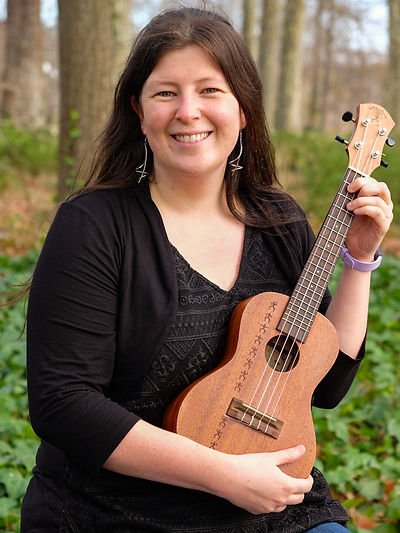In this post Merrick Powell sits down with Dr Anna Fiveash (@Anna5ash), 2022 DECRA recipient, to talk about past and future research.

Firstly, hi Anna! Thanks for having a chat with me today. Would you mind starting by introducing yourself and telling me a bit about where you are and what you are working on at the moment?
Hi Merrick, thanks, it’s great to be involved with AMPS again! I’m Anna Fiveash, and I’m currently a postdoctoral researcher working in Lyon, France, on rhythm processing in music and speech. I’ve been here almost 5 years now, working on rhythm and rhythmic priming studies in adults and children, where I collaborate primarily with Barbara Tillmann (Lyon, France) and Reyna Gordon (Nashville, USA). It’s really exciting work, we’re investigating how we can use the regularities in music rhythm to help the processing of the less regular speech signal. I look at this both behaviourally and with EEG, and with typically developing children/adults and those who have developmental language disorder or dyslexia. Check out our recent publications on Processing Rhythm in Speech and Music Framework (PDF here), and When Visual Cues Do Not Help the Beat.
Before my postdoc, I was working on syntactic processing in music and language with Bill Thompson and Genevieve McArthur in Sydney (where we met!), and before that I did my Masters in Jyväskylä, Finland, investigating how musical valence affects lyric processing.
One big reason that I wanted to have a chat today was to congratulate you on being awarded a DECRA for your ‘Music and speech as a window into the predictive brain’ project. An amazing and well-deserved achievement! Would you be able to tell me a bit about how the project came about, and what you are hoping to achieve with the project?
Thanks very much, yes I’m super excited about this project, and the move back to Sydney to start in January 2023. The project is all about investigating in more detail how the brain predicts upcoming information. There are a lot of theories around this, but they are often limited to one domain (e.g., music), or one type of prediction (e.g., what is coming next). Based on my previous work in music and language syntax during my PhD and music and language rhythm during my postdoc, I felt that I was in the unique position to combine and investigate the two modalities: music and speech, with two different prediction types: what and when. I then proposed to look at music production as well as music perception, musicians as well as non-musicians, and to use cutting edge EEG analysis techniques which we have been developing during my postdoc. I think the unique combination of all these factors will allow for a fruitful and informative investigation into predictive processing in the brain, which will hopefully be useful in other fields as well, and for rehabilitation purposes in the long run.
Thinking about your journey and career so far, how would you say that working overseas has helped you progress and develop as a researcher?
Working overseas has really allowed me to follow exactly what I’m interested in, and allowed me to learn from many different researchers and labs with different techniques, skills, and ways of working. I have always followed the program or job rather than chosen countries specifically, but it has worked out very well, as living in Finland was an amazing and unique experience, and I have absolutely loved living in France (my initial contract was for 2 years, and we kept extending as long as possible!). I think living overseas also forces you to be open to new experiences, and flexible in your way of living and adapting to different environments, and I think all of this is very important to research too. I have also met lots of amazing people that have influenced me in different ways, and I think all of this is helpful for research as well, including feeling comfortable meeting and networking with people from many different backgrounds and disciplines. I think it’s really nice to get out of your comfort zone and see the way that different labs operate. It also makes you learn lots of different skills that you might not have needed if you had stayed in one place/position.
What advice would you have for current PhD students, or other early career researchers, who are looking to start thinking about future projects and developing applications for early career grants?
My main advice would be to follow what you’re interested in and passionate about, and to try to combine your experience across different areas to find something unique to you and your skillset. This makes it a lot easier (and more interesting!) to develop the application, and I think that passion would come through in the grant too. You might have a vague idea of what you want to investigate, but then when actually developing the project, I found it really helpful to talk about it with friends, and try and describe what you’re trying to do – this is often very hard, and makes you realise where the gaps are. When I was stuck, I would go for a walk with a friend who was a researcher in a different field entirely. Trying to describe the problem and why I was stuck really helped me push forward, and insight from people outside of your field is also really helpful to get a bigger picture view. I think it’s also a great idea to keep a notebook of future research ideas handy, and anytime you think of something you’re interested in but can’t do right now, add it in there! There might be a theme that emerges which you can develop later.
Do you have any links to recent publications, talks, or anything else that you would like to share?
Yes! I have two recent publications that I would like to share – one is our new Processing Rhythm in Speech and Music Framework – you can see it here: https://content.apa.org/doiLanding?doi=10.1037%2Fneu0000766
or on ResearchGate: https://www.researchgate.net/publication/353380961_Processing_Rhythm_In_Speech_And_Music_Shared_Mechanisms_And_Implications_For_Developmental_Speech_And_Language_Disorders, and feel to email me if you can’t access the pdf.
We also recently published a new study looking at audio-visual cues in rhythmic priming, which is open access here: https://www.frontiersin.org/articles/10.3389/fpsyg.2022.807987/full
Thanks Merrick, and goodluck to everyone making new applications!

